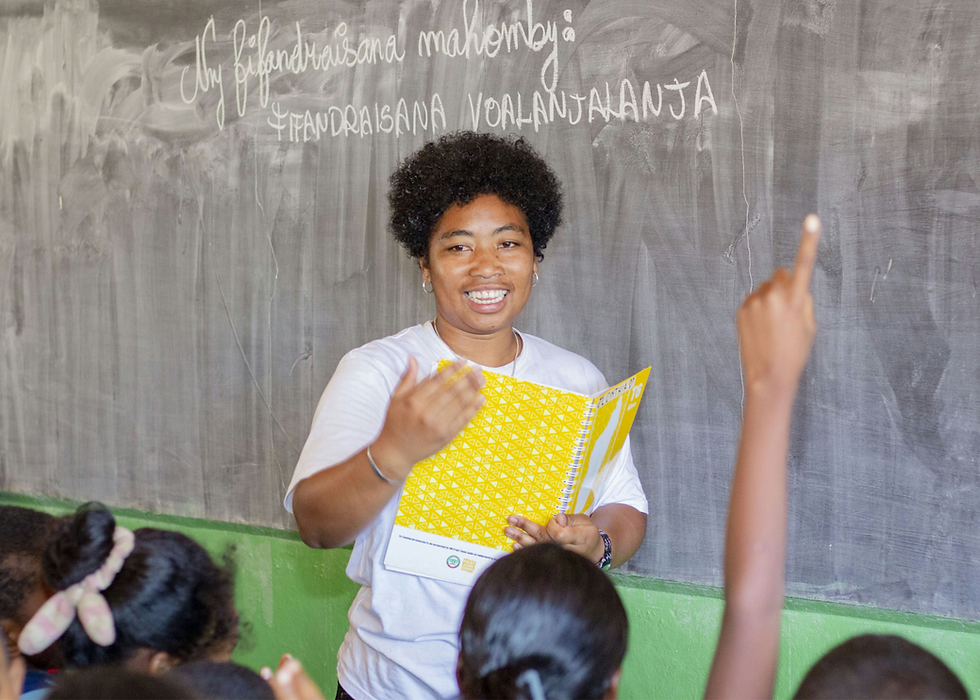The why and how of amplifying the "community" value in sexuality education
- Laura Leeson

- Nov 11, 2021
- 3 min read
Updated: Nov 12, 2021
When Projet Jeune Leader asks parents who they think should teach their children about puberty and reproductive health, they most often say the school.
Yet, when we talk to schools, they say such discussions are parents’ responsibility.
How does Projet Jeune Leader bridge this divide? One way is by amplifying the value of community in our work.
By expanding definitions of community (and moving away from the “us” versus “them” narratives), we find that parents and teachers are more likely to be supportive of and engaged with comprehensive sexuality education.

One reason is because the community value also activates the compassion value and stimulates people’s concern for others.
Parents sometimes tell Projet Jeune Leader that they view issues like early pregnancy as problems that only affect other, “ill-disciplined,” and/or older adolescents – not their own children. Using framing that emphasizes community and compassion encourages concern and collective responsibility for supporting all young people – and prevents people from holding adolescents or solely their parents/teachers responsible for their development and outcomes.
As one of our school principals once said:
"There has been a strong relationship, starting with Projet Jeune Leader and the school, then involving the PJL Educator, the students, and their parents. It's created this mutual exchange and support that has led to success for our students."
Emphasizing community within a broader context in sexuality education also helps adults see that teaching kids about sexuality is feasible.
Adults are not only daunted by the sensitivity surrounding sexuality education; parents also often tell us they are too overwhelmed by the stresses of daily life (for example, earning income) to talk to their children about such issues. Teachers, meanwhile, say they are already overburdened by their teaching schedules, and teaching sexuality education would be an impractical demand for which they receive little support.
Invoking values of community in sexuality education helps distribute responsibility across household, school, and community systems – and lets adults see themselves as part of the solution, while having involvement from other allies (especially those viewed as professionals) to help support youth’s healthy development.
Take, for example, this testimony from a Department Head for Secondary Education in the Amoron’i Mania Region:
“Projet Jeune Leader’s work is very important in the Amoron’i Mania region right now. It is greatly helping our social development, especially in the education sector. We feel that their work is complementary to our areas of responsibility. My message for parents is: children are generally the responsibility of both parents, at home, and teachers, in the classroom. Children need to be physically, mentally, and spiritually raised, and I urge you all as parents to welcome Projet Jeune Leader because it is platform whereby we can help one each other better support our children.”
This testimony invokes the community value without explicitly naming it – and because the person quoted is a respected, credible authority figure in the public education system, their testimony holds more weight in the eyes of local communities. We use this quote frequently in strategic communications targeting audiences of parents or school officials.

Finally, using the community frame also helps us introduce our educators as interconnected mentors, youth leaders, and role models in the community, and explain the role they play in supporting adolescents’ healthy development. This is important, as one of main tactics sexuality education opponents use is to frame sexuality education as an “outsider intervention” – especially in the Global South.
Strategically – and genuinely – showing that educators are essential parts of the community protects against the “us vs them” narratives that sexuality education opponents use.
Parents often provide us the most powerful testimonies to this end.
"We parents trust in you and the education you provide to our children. It is amazing to see motivated young people (the PJL Educators) taking care of their little "brothers and sisters" at school. Your presence is very good for us parents, it helps us a lot, and we feel at peace that our children will improve as well."

Want more useful tips about building community support for comprehensive sexuality education? Check out “CSE We Can Count On”, our new resource document that provides actionable guidance for cultivating sustainable community buy-in for comprehensive sexuality education: https://www.projetjeuneleader.org/resources/community-support



